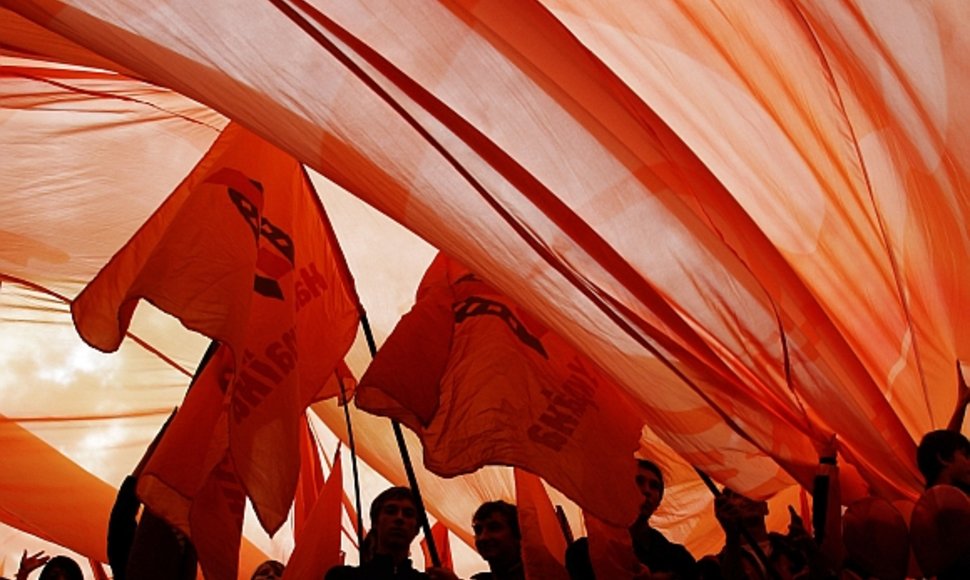Searches were carried at the homes of several people on Tuesday and they were questioned as witnesses.
The Committee's spokesman Vladimir Markin did not name the organizers of the seminar but claimed that it was funded by Georgian lawmaker Givi Targamadze.
Russia's latest accusations remind of an incident in 2006 when Russia's television broadcast alleged phone conversations between Targamadze, the then chairman of the Georgian parliament's Defense and Security Committee, and the then officials from the Lithuanian Ministry of Foreign Affairs, Albinas Januška and Renatas Juška.
Lithuanian observers say it might be related to previous accusations in the Russian media regarding a seminar on election observation, organized by a non-governmental organization.
"Russian citizens from various regions were sent to Lithuania in spring 2012 to take part in a seminar dedicated to coup techniques by the example of 'color revolutions' in other countries," the Committee spokesman Vladimir Markin was quoted by news agency Interfax.
He named three people who attended the seminar and said that searches were carried out in their homes. "Investigative materials show that such seminars were attended by Taisia Alexandrova, Anna Kornilova, Yuri Nabutovsky, and others," Markin said.
The Investigative Committee is accountable to the Russian president.
Several Lithuanian officials and observers told BNS these accusations might be related to a seminar organized by the Eastern Europe Studies Centre in the run-up to the Russian State Duma elections. Following the seminar, accusations in the Russian media said the opposition received training in Lithuania on how to organize a revolution.
Kristina Vaičiūnaitė, head of the Centre, said on Tuesday the seminar focused on election observation.
"Our center organized four or five election observation missions. So we have methodologies. The seminar focused on the most common violations, on how elections should be observed, what rights of election observers are," Vaičiūnaitė told BNS.
In her words, journalists from the RTR television asked for an interview after the seminar and they came to Lithuania to make a story with unbased accusations.
Sergey Perepilitsa, editor of the First Baltic Channel, told BNS on Tuesday that the coverage was not made by the channel but by the Russian-based First Channel (Pervyi Kanal).
Vaičiūnaitė expressed doubts whether the accusations had to do with the specific seminar, emphasizing that the organization had no capacities of holding such an event.
"As a center, we were established after all of the 'color revolutions' so we would not have the capacities to teach such things, although we sometimes get wrongfully accused, this is probably due to our projects in Belarus," she said.
Markin said the searches were carried out on the suspicion of finding documents and other items crucial to the investigation. Digital materials were seized from the three during searches in their homes, they themselves were taken to the Investigative Committee for questioning as witnesses.
The head of the Leftist Front movement Sergey Udaltsov said on Tuesday he was not familiar with the people whose homes were searched, noting this could be an attempt to “supplement” his case.
In his words, even if the individuals named by the spokesman of the Investigative Committee attended this type of events, "there's nothing criminal about it."
Udaltsov is a prominent opposition figure charged with conspiracy to organize mass riots in Russia.
Attempts to involve Lithuania in feuds with opposition
Russia's special services are trying to involve Lithuania into their fight with the Russian opposition, political scientist Nerijus Maliukevičius has commented on Moscow's accusations that members of the Russian opposition were trained for a coup in Lithuania.
"In this case, we are being involved in the Russian special services' fight with their opposition," Maliukevičius of the Institute of International Relations of Political Science at Vilnius University told BNS.
"It's a continuous active measure which used to be employed during the Soviet times by the special services and which is still employed in modern Russia when allegedly classified records are used and information is thrown on TV and alleged Georgian and Lithuanian participants are involved, and attempts are made to show them as wishing to destroy modern Russia and support the opposition," Maliukevičius said.
The expert of international relations also believes the timing chosen by Russia was not accidental and was in response to recent parliamentary elections in Georgia and Lithuania, after which the governments of these countries started talking about a reset of relations with Russia.
"Attempts are being made to discredit previous policies even more," Maliukevičius said.












